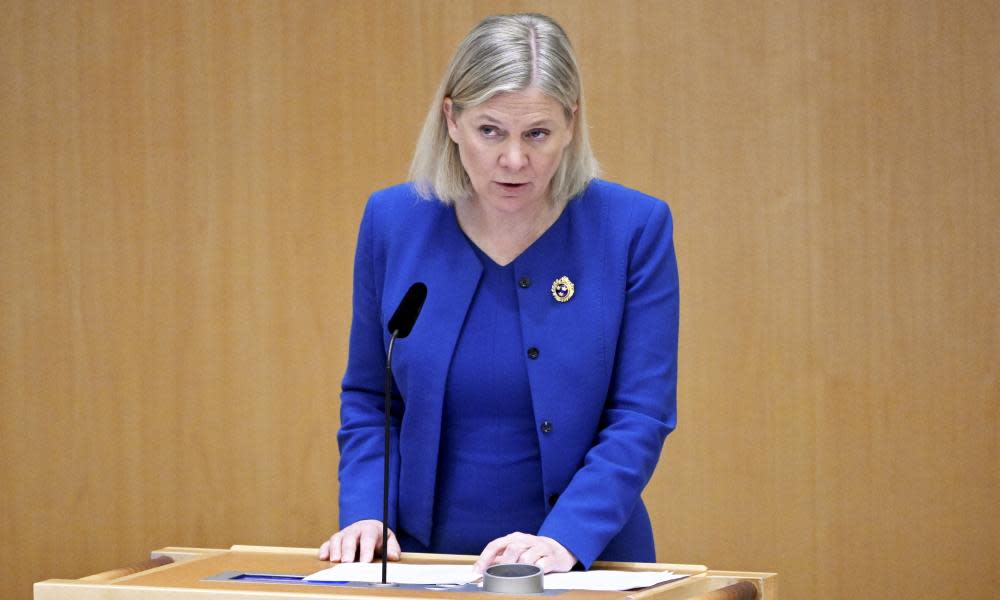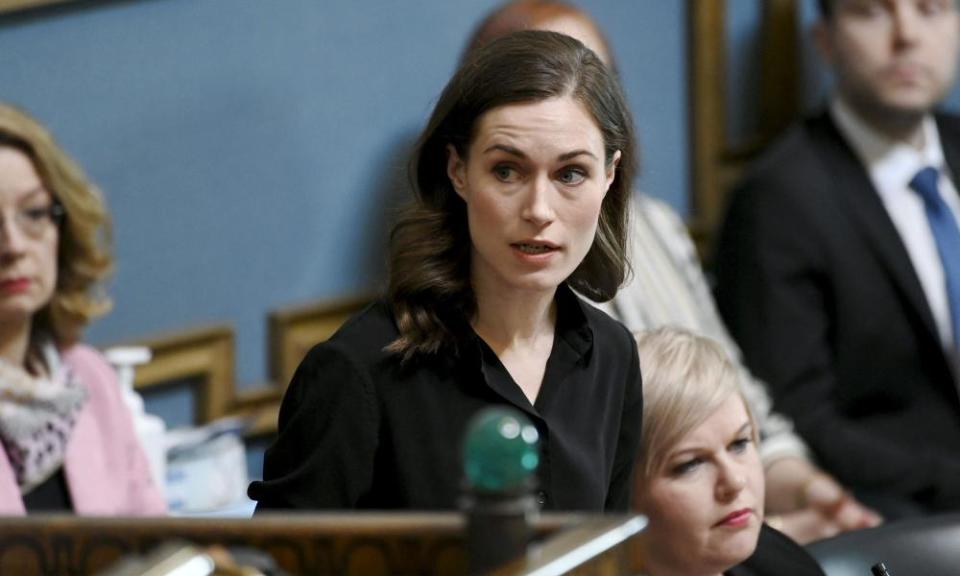Sweden follows Finland in confirming it will apply to join Nato

Vladimir Putin warns that any deployment of alliance military infrastructure ‘would certainly provoke’ Russian response
The Swedish government has confirmed it intends to apply for membership of Nato, joining neighbouring Finland in a dramatic decision that marks one of the biggest strategic consequences of Russia’s invasion of Ukraine to date.
“There is a broad majority in Sweden’s parliament for Sweden to join Nato,” said the prime minister, Magdalena Andersson. “This is the best thing for the security of Sweden and its people … We are leaving one era behind us and entering a new one.”
Andersson told reporters after a parliamentary debate on Monday that Sweden would be “in a vulnerable position” while the application was processed, but that ministers saw no direct military threat from Russia at present.
Stockholm had received security assurances from key partners, including the US, Britain, Germany, France, she said, and on Monday Denmark, Norway and Iceland also pledged support, saying they would “assist Finland and Sweden by all means necessary” if they were attacked before obtaining Nato membership.
However, the government “can’t exclude that we will be subjected, for example, to disinformation and attempts to scare and divide us”, Andersson said, adding that if its application was approved, Sweden would not want permanent Nato military bases or nuclear weapons on its territory.
The decisions by the two Nordic governments, which have maintained strict policies either of neutrality or military non-alignment since the end of the second world war, drew a sharp initial response from Moscow.
Russia’s deputy foreign minister, Sergei Ryabkov, said the countries “should have no illusions that we will simply put up with it”, calling the move “another grave mistake with far-reaching consequences” and warning that the “general level of military tension will increase”.
The Russian president, Vladimir Putin, later said Moscow did not see Finnish and Swedish Nato membership as a direct threat in itself. “Russia has no problem with these states - none,” Putin said.
“And so in this sense there is no immediate threat to Russia from an expansion of Nato to include these countries,” he said. He warned, however, that deployment of military infrastructure on their territories “would certainly provoke our response”.
The Kremlin spokesperson, Dmitry Peskov, also said Moscow would “follow very carefully what will be the consequences” of the Nordic nations’ move “for our security, which must be ensured in an absolutely unconditional manner”.
Andersson said Sweden’s Nato ambassador would formally hand over Stockholm’s application to the alliance headquarters in Brussels “within the next few days”, adding that the membership request would be submitted simultaneously with Finland’s.
The Finnish government confirmed its intention to join Nato on Sunday, shortly before Andersson’s ruling Social Democrats abandoned decades of opposition to back a Swedish bid for membership, making Monday’s Riksdag debate a formality.
Russia has previously advised both countries against joining Nato, saying such a move would oblige it to “restore military balance” by strengthening its defences in the Baltic Sea region, including by deploying nuclear weapons.
Finland shares an 810-mile (1,300km) land border with Russia, and Sweden a maritime border. Both countries have for decades considered that joining the 30-member, US-led Nato alliance would represent an unnecessary provocation of Moscow.
However, Putin’s invasion of Ukraine on 24 February has led to a profound change in thinking, with public support for Nato accession in Finland more than trebling to about 75% and rising to between 50% and 60% in Sweden.
The Finnish parliament in Helsinki also debated the issue on Monday in a session likely to last longer than one day. While 85% of Finland’s 200 MPs back membership, 150 have requested to speak and a vote was not expected on Monday.
“Our security environment has fundamentally changed,” the prime minister, Sanna Marin, told parliament as she opened the debate. “The only country that threatens European security, and is now openly waging a war of aggression, is Russia.”

The Nato secretary general, Jens Stoltenberg, has said the countries would be “welcomed with open arms” and their accession would be quick, although Turkish objections could delay the process, which requires unanimity among members.
Sweden’s defence minister, Peter Hultqvist, said on Monday that Stockholm was working to overcome Ankara’s reservations, which centre on Swedish support for the Kurdish PKK group, designated a terrorist organisation by Turkey, the EU and the US.
The foreign ministers of Sweden and Finland, Ann Linde and Pekka Haavisto, would travel “soon” to Turkey for talks, the Swedish foreign ministry said. Speaking before a meeting with EU foreign ministers in Brussels, the Canadian foreign minister, Mélanie Joly, called for Finland and Sweden’s speedy accession.
“Our goal is to be amongst the first countries to be able to ratify the accession of Sweden and Finland,” she said. “We need to meet this moment. This is historic and it is way more important than any bilateral issues.”
Nato and the US have both said they are confident Turkey will not hold up Sweden’s accession. “I’m confident we will be able to address the concerns Turkey has expressed in a way that doesn’t delay the membership,” Stoltenberg said on Sunday.

 Yahoo Movies
Yahoo Movies 
